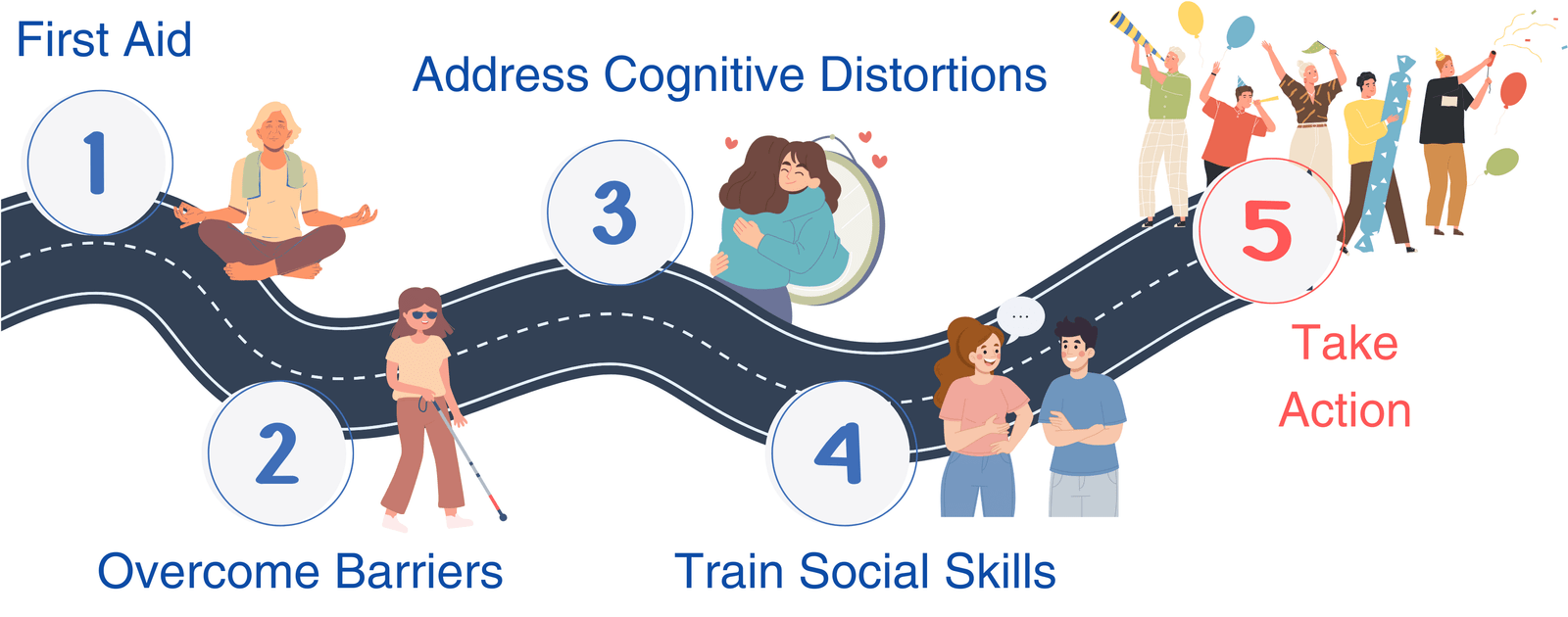
Take Action
When we took care of our barriers to social contact, maladaptive cognitions, and social skills, the final step on the road out of loneliness is making sure that we regularly meet people and have a daily practice routine to rely on for our progress.
The Propinquity Effect describes the tendency for people to form social relationships with those they encounter frequently or who are physically nearby. A study by Festinger et al. (1950)1 found that college students were more likely to become friends with individuals living next door than with those living farther away; a good example of how natural friendships and social connections happen when we meet people regularly and are not standing in our way. If you are not seeing the same people at least 3 days a week, consider changing your life situation, potentially changing your job or getting into some sort of program, sport, organization, or charity where you meet the same people regularly.
Additionally it can be very helpful to get in touch with new people regularly too, especially people with shared interests and who are outside of your current social bubble. Write down a list of what makes you most excited. Search online or through any other medium for groups, locations, and events linked to the topics that excite you. Make an effort to join these groups or go to these places at least once a week.
When you already know a few activities and events that excite you, another option is to ask people you are in loose contact with if they would like to accompany you to these activities. Shared experiences can provide a good bonding ground.
A more advanced strategy to meet new people, which might look frightening when you still feel very lonely but often comes more and more naturally the more authentic, self-fulfilled, and appreciative you live, is to approach other people and strike up conversations with them proactively. A simple strategy is to let your curiosity guide you: when you notice something about someone that makes you curious, ask them about it respectfully. Although the topic is more complex than this, some basic things to keep in mind when approaching other people are the following:
- Be respectful, especially of others’ boundaries.
- Do not expect anything; you don’t know the other person or the state they are in.
- Do not take rejection personally; it is not personal.
- Be open about your intentions.
- Don’t put other people on a pedestal; it’s okay to talk to anyone as long as they are open to it; we are all just humans, and most of us enjoy conversation.
- Let your curiosity guide you.
It can be challenging to ask people out, whether with platonic or romantic intent, whether you’ve already met them a couple of times, they’re coworkers, or complete strangers. Taking action takes courage and is often uncomfortable in the beginning. However, courage paired with reason often yields great rewards in life. Plenty of positive anecdotes report how people skyrocketed their social lives by open-mindedly and courageously approaching others with good intentions. Despite its many merits, this assertive strategy to meet new people is often not necessary when you have a normal social life and have dealt with the other points on the road out of loneliness, so don’t worry if this is not your thing. If you want to try it out, you can make it another one-week challenge to ask the people you meet everything that you wonder about them. Be honest, openhearted, and empathetic.
Overview of The Road Out of Loneliness
The following PDF contains the main exercises mentioned in “The Road Out of Loneliness.” Read through it periodically to stay familiar with the practices. On the first page, you’ll find the exercises that can be practised during social interactions. After that, you’ll see more general but equally important exercises that can be practised outside of immediate social interactions. Because many exercises benefit from taking notes, keep a notepad ready if possible—either on your phone or in paper form.
The second PDF contains a daily checklist you can print out, which can help to stay on track and monitor progress.
Sources
- Festinger, L., Schachter, S., & Back, K. (1950). Social pressures in informal groups; a study of human factors in housing.Harper. ↩︎